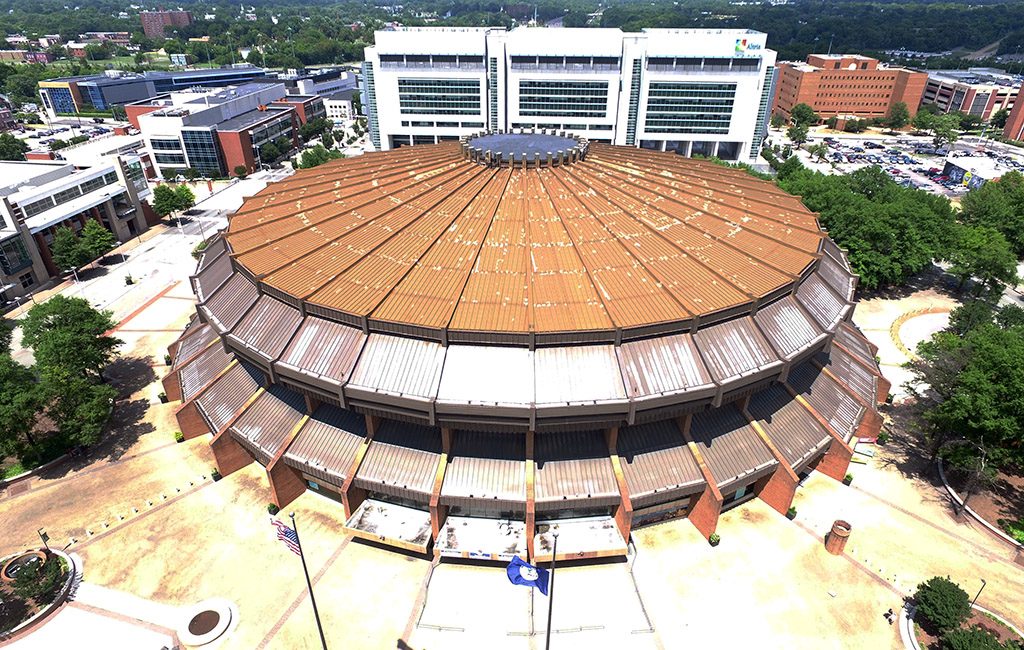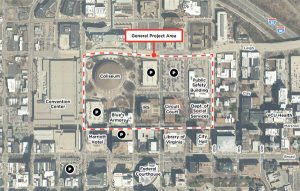After initially taking things slow, the city is ready to ramp up discussions with an investor group led by Dominion Energy CEO Tom Farrell to replace the aging Richmond Coliseum with a new arena and redevelop much of the surrounding city-owned acreage.
Mayor Levar Stoney’s office on Wednesday said it will begin formal negotiations with Farrell’s NH District Corp., a group that was the lone respondent to an RFP put out by Stoney late last year, dubbed the North of Broad/Downtown Neighborhood Redevelopment Project.
The RFP went out shortly after news broke that Farrell, along with Altria CEO Marty Barrington, retired SunTrust executive C.T. Hill and others, had been plotting a new arena, new convention center hotel and transformation of about 10 acres bounded by North Fifth, East Marshall, North 10th and East Leigh streets.
Stoney’s office said Wednesday it expects negotiations to take place throughout the summer and, if successful, the project would be presented to City Council in the fall.
“Though many questions remain and there are important points to negotiate, based upon the results of this review process, I believe there is potential in this proposal to provide transformational change in an underutilized portion of downtown, without negatively impacting the city finances or debt capacity,” the mayor said.
Questions still to be fleshed out publicly include the future ownership structure of the city-owned properties, the cost and how it will be financed.
The RFP included a requirement for financing that would not increase the city’s debt load, but that potentially could take advantage of tax-increment financing, which allows for new tax revenue generated by the project to be put back into the development.
Prior to the RFP, Farrell’s group had retained seasoned developers and zeroed in on some details, including eyeing a 17,000- to 18,000-seat arena where the Coliseum now stands, a multi-level food and entertainment complex within the existing Blues Armory, and a new hotel.
The RFP called for much of the same major pieces, while allowing Stoney to add his desires for mixed-income housing, reuse of sites occupied by outdated city buildings, job creation for local residents, workforce development and involvement of minority-owned businesses in the development process.
Jeff Kelley, spokesman for NH District Corp., said in an email statement Wednesday that the group is excited to keep moving.
“We have much more listening to do, and we look forward to working with the city to outline details of how next steps of the RFP process will advance,” the statement read. “We commit to additional public engagement to further refine the plan. Together, everyone in this community can create a new world-class housing, retail, hospitality, office and entertainment destination in Virginia’s capital city.”
After initially taking things slow, the city is ready to ramp up discussions with an investor group led by Dominion Energy CEO Tom Farrell to replace the aging Richmond Coliseum with a new arena and redevelop much of the surrounding city-owned acreage.
Mayor Levar Stoney’s office on Wednesday said it will begin formal negotiations with Farrell’s NH District Corp., a group that was the lone respondent to an RFP put out by Stoney late last year, dubbed the North of Broad/Downtown Neighborhood Redevelopment Project.
The RFP went out shortly after news broke that Farrell, along with Altria CEO Marty Barrington, retired SunTrust executive C.T. Hill and others, had been plotting a new arena, new convention center hotel and transformation of about 10 acres bounded by North Fifth, East Marshall, North 10th and East Leigh streets.
Stoney’s office said Wednesday it expects negotiations to take place throughout the summer and, if successful, the project would be presented to City Council in the fall.
“Though many questions remain and there are important points to negotiate, based upon the results of this review process, I believe there is potential in this proposal to provide transformational change in an underutilized portion of downtown, without negatively impacting the city finances or debt capacity,” the mayor said.
Questions still to be fleshed out publicly include the future ownership structure of the city-owned properties, the cost and how it will be financed.
The RFP included a requirement for financing that would not increase the city’s debt load, but that potentially could take advantage of tax-increment financing, which allows for new tax revenue generated by the project to be put back into the development.
Prior to the RFP, Farrell’s group had retained seasoned developers and zeroed in on some details, including eyeing a 17,000- to 18,000-seat arena where the Coliseum now stands, a multi-level food and entertainment complex within the existing Blues Armory, and a new hotel.
The RFP called for much of the same major pieces, while allowing Stoney to add his desires for mixed-income housing, reuse of sites occupied by outdated city buildings, job creation for local residents, workforce development and involvement of minority-owned businesses in the development process.
Jeff Kelley, spokesman for NH District Corp., said in an email statement Wednesday that the group is excited to keep moving.
“We have much more listening to do, and we look forward to working with the city to outline details of how next steps of the RFP process will advance,” the statement read. “We commit to additional public engagement to further refine the plan. Together, everyone in this community can create a new world-class housing, retail, hospitality, office and entertainment destination in Virginia’s capital city.”




